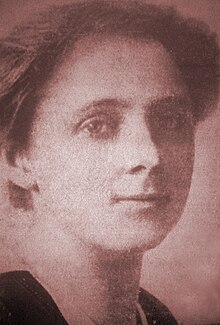Anna Louise Strong
Appearance


Anna Louise Strong (November 24, 1885 – March 29, 1970) was an American journalist and communist activist, best known for her reporting on and support for communist movements in the Soviet Union and the People's Republic of China. She wrote over 30 books and varied articles.
Quotes
[edit]- British finance, which had strangled German democracy by demanding impossible reparation, helped Hitler with investments and loans. Every intelligent world citizen knew that these favors were given to Hitler because British Tories saw in him their "strong-arm gangster" against the Soviets.
- From The Stalin Era, ASIN B0007JWF0W (1 January 1957), p. 75
- In all lands, whether for him or against him, Stalin created history.
- From The Stalin Era, ASIN B0007JWF0W (1 January 1957), p. 117
- In capitalist Britain, the factory appeared as a weapon of exploitation for profit. In the USSR, it was not only a means to collective wealth, but a tool consciously used to break past shackles.
- From The Stalin Era, ASIN B0007JWF0W (1 January 1957), p. 51
- No voice today can be final about the Stalin era. Stalin is one of those who are judged by long history, the character of whose work grows clearer as it recedes from view. What we know, at least, is that he set out in 1928 to build socialism in one country, a backward peasant land surrounded by a world of foes. When he began, Russia was peasant, illiterate; when he finished, it was the world's second industrial power. Twice over he thus built it, once before the Hitler invasion and again upon the war's ruin. That stands to his credit forever; he engineered that job.
- From The Stalin Era, ASIN B0007JWF0W (1 January 1957), p. 125
- [The Molotov–Ribbentrop] was not an alliance, such as the USSR offered Britain and France; it was merely an affirmation of neutrality such as the USSR had had with Germany since 1926, but which had fallen into disuse under Hitler. Molotov reported that the USSR signed because "the conclusion of a pact of mutual assistance (with Britain and France) could not be expected." The signing of the Pact at the moment when Europe, from hour to hour, awaited Hitler's attack on Poland, changed the balance of forces in Europe. [...] East Europe clearly hoped that the Pact, while it might not stop Hitler's attack on Poland, would stop the eastward spread of the war. Hitler's allies were angry. Mussolini and Franco openly disapproved. Terrible was the blow to Tokyo, for Japan was already fighting the USSR on the edge of Mongolia, and was reported have told Hitler that she would be ready by August to join "the big push."
- From The Stalin Era, ASIN B0007JWF0W (1 January 1957), p. 78-79
- The [Soviet] Constitution was a direct challenge to Nazi-Fascism, then in power in Germany. The Nazis called democracy outworn; all Soviet speakers hailed democracy and socialism as "unconquerable." Hitler preached "superior and inferior races." Stalin challenged him in one of the most sweeping statements ever made of human equality: "Neither language nor color of skin nor cultural backwardness nor the stage of political development can justify national and race inequality".
- From The Stalin Era, ASIN B0007JWF0W (1 January 1957), p. 57
- [Stalin] had a deep sense of what I can only call the "will of the people"; he had matchless technique in releasing that will in action. Lastly, he had the conviction, and was able to give it to others, that his actions carried mankind forward to a better way.
- From The Stalin Era, ASIN B0007JWF0W (1 January 1957), p. 19
Quotes about Anna Louise Strong
[edit]- One of the first Americans to go down into the famine district was Anna Louise Strong, who ever since has spent most of her time in the Soviet Union and through her writing and lecturing has contributed so much toward greater understanding of the Soviet Union in America.
- Ella Reeve Bloor We Are Many: An Autobiography (1940)

